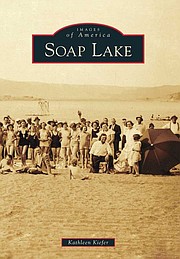New books available about Moses Lake, Soap Lake
MOSES LAKE - Arcadia Publishing's Images of America series has added two new books that should be of interest to residents of the Columbia Basin.
Soap Lake, by Kathleen Kiefer, and Moses Lake by Freya Hart and Ann Golden, were released recently by Arcadia. These pictorial histories offer more than 200 vintage black-and-white images each along with memories of days gone by.
Both books are available for purchase at the Moses Lake Museum, Grant County Historical Society, The Bookery, Skaug Brothers Ace, Michael's Market & Bistro and other local retailers.
Groundwater leaching through hundreds of feet of basalt over thousands of years created Soap Lake, which has a high concentration of sulfate, carbonate, bicarbonate, sodium, and chloride and a pH at or close to 10.0.
Prior to the development of penicillin and sulfa drugs in the 1940s, Soap Lake became widely known for the healing quality of its waters. It attracted thousands of visitors each summer, some of whom arrived on stretchers at the nearby train station.
Kathleen R. Kiefer visited Soap Lake for the first time in April, 1980. Within a few months she was on her way back on a bicycle from Kirkland. She arrived around 5:30 in the afternoon, about the time Roxie Thorson was sipping port on the porch of her hotel and Soap Lake Products business.
"I didn't have two dimes to rub together, but I knew Soap Lake is where I wanted to be," Kiefer said.
Kiefer worked out a deal with Thorson to stay at the hotel and took up residence. She started her first business as writer-in-residence at Thorson's Hotel and went on to start a small paper called The New Leaf, documenting the town and its visitors.
Moses Lake stands out as the boomtown of Grant County. A period of exponential growth began in the 1940s as the result of water and air power.
From the pioneering days of gasoline-powered pump irrigation to the phenomenal success of modern irrigated farms, water has played the pivotal role in Moses Lake's Cinderella story of agricultural empire in an otherwise arid desert.
Activation of the Moses Lake Army Air Base (later Larson Air Force Base) during World War II added to the population boom of more than 3,600 percent by 1960.
Freya (Hart) Liggett, 34, is a Moses Lake transplant. She is a 2000 graduate of Linfield College with a degree in anthropology focusing on museum studies.
Liggett conducted graduate work at the State University of New York Stony Brook in archaeology before accepting the position of museum manager for the Moses Lake Museum & Art Center in 2007.
Ann Golden, 36, moved to the Pacific Northwest from Southern California in 1995. She is a 2000 graduate of Eastern Washington University with a degree in anthropology with an emphasis in museology and a minor in history.
Golden has been the curator for the Moses Lake Museum & Art Center since 2000.





